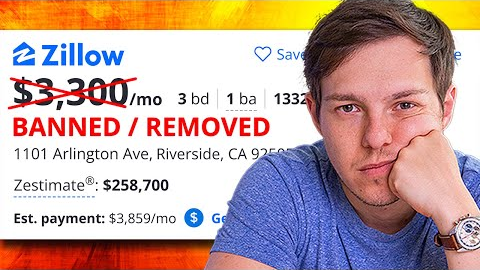It’s Over: The Housing Market Just Collapsed
293,292 View
Share this Video
- Publish Date:
- December 5, 2022
- Category:
- Appreciation Investing
- Video License
- Standard License
- Imported From:
- Youtube
Tags

Lets talk about a new proposal that would block wall street landlords, why rental prices are declining, and what this means for the 2023 housing market - Enjoy! Add me on Instagram: GPStephan
GET YOUR FREE STOCK WORTH UP TO $1000 ON PUBLIC FOR A LIMITED TIME - USE CODE GRAHAM: http://www.public.com/graham
NEW BANKROLL COFFEE NOW FOR SALE: http://www.bankrollcoffee.com
GET MY WEEKLY EMAIL MARKET RECAP NEWSLETTER: http://grahamstephan.com/newsletter
The YouTube Creator Academy:
Learn EXACTLY how to get your first 1000 subscribers on YouTube, rank videos on the front page of searches, grow your following, and turn that into another income source: https://the-real-estate-agent-academy.teachable.com/p/the-youtube-creator-academy/?product_id=1010756&coupon_code=100OFF - $100 OFF WITH CODE 100OFF
WHY RENTS ARE INCREASING:
1. There’s fewer affordable units on the market.
Between 2014 and 2018, the number of low-cost rentals dropped by HALF A MILLION UNITS PER YEAR…with the main reason being: They simply were no longer profitable. Older buildings were frequently torn down to build new ones, and with construction, land, and labor costs having increased - owners are forced to construct “luxury units” to make any sort of return on their investment.
2. There’s more demand for rentals.
Since the 2008 Mortgage Crisis, demand has increased faster than almost any other time in history…and, during the pandemic, this was exacerbated. As home prices increased, people who were unable to afford a home were forced to rent…driving up demand even further.
3. Wealthier households are ALSO choosing to rent
In fact, it was found that - high income households have driven MOST of the growth in renters, since 2010…and that means, as high income earners chose to downsize, relocate, and save money…they’re driving up the cost, because they’re able to afford more.
4. On top of that, LANDLORD EXPENSES are ALSO increasing.
Aspects like Property Tax, Insurance, Labor, Repairs, and Materials are ALL COSTING MORE…and, if a landlord is barely breaking even…they have to raise prices or risk going out of business.
5. And finally, Home Prices Are Getting More Expensive.
This means the break even cost increases with a higher purchase price, causing prices to set higher.
THE WALL STREET LANDLORD PROPOSAL:
This bill proposes several changes that would discourage “SPECIFIED LARGE INVESTORS” from purchasing a property: the first would DISALLOW interest payments from being deducted as an expense, as well as eliminate any claims to depreciation that would offset taxable income.
In addition to that, there would be a sale or transfer tax equal to the value of the property - so, if a home sells for $350,000 and a Wall Street Conglomerate wants to buy it - they have to pay double. This bill also gives large investors “a grace period of 18 months after the bill becomes law to “sell properties and avoid the tax.”
This would be applied to anyone who’s holds more than $100,000,000 worth of assets at any time during such taxable year.
REALISTICALLY, I can ABSOLUTELY see a “surtax” being added to certain Wall Street Landlords who will be required to pay an additional property or income tax that goes back to the city in which the property is located…but, anything more is going to be difficult, if not impossible…and, it still doesn’t address the core issue - that, more homes need to be built.
My ENTIRE Camera and Recording Equipment:
https://www.amazon.com/shop/grahamstephan?listId=2TNWZ7RP1P1EB
For business or one-on-one real estate investing/real estate agent consulting inquiries, you can reach me at [email protected]
*Some of the links and other products that appear on this video are from companies which Graham Stephan will earn an affiliate commission or referral bonus. Graham Stephan is part of an affiliate network and receives compensation for sending traffic to partner sites. The content in this video is accurate as of the posting date. Some of the offers mentioned may no longer be available. This is not investment advice. Public Offer valid for U.S. residents 18+ and subject to account approval. There may be other fees associated with trading. See Public.com/disclosures/













